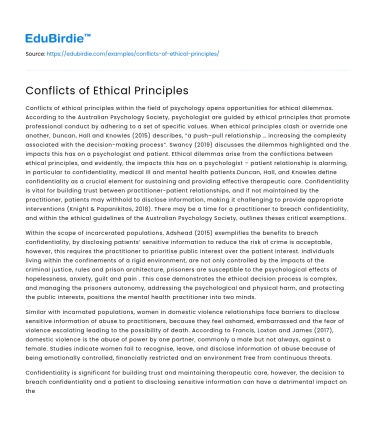Conflicts of ethical principles within the field of psychology opens opportunities for ethical dilemmas. According to the Australian Psychology Society, psychologist are guided by ethical principles that promote professional conduct by adhering to a set of specific values. When ethical principles clash or override one another, Duncan, Hall and Knowles (2015) describes, “a push–pull relationship … increasing the complexity associated with the decision-making process”. Swancy (2019) discusses the dilemmas highlighted and the impacts this has on a psychologist and patient. Ethical dilemmas arise from the conflictions between ethical principles, and evidently, the impacts this has on a psychologist – patient relationship is alarming, in particular to confidentiality, medical ill and mental health patients.Duncan, Hall, and Knowles define confidentiality as a crucial element for sustaining and providing effective therapeutic care. Confidentiality is vital for building trust between practitioner-patient relationships, and if not maintained by the practitioner, patients may withhold to disclose information, making it challenging to provide appropriate interventions (Knight & Papanikitas, 2018). There may be a time for a practitioner to breach confidentiality, and within the ethical guidelines of the Australian Psychology Society, outlines theses critical exemptions.
Within the scope of incarcerated populations, Adshead (2015) exemplifies the benefits to breach confidentiality, by disclosing patients’ sensitive information to reduce the risk of crime is acceptable, however, this requires the practitioner to prioritise public interest over the patient interest. Individuals living within the confinements of a rigid environment, are not only controlled by the impacts of the criminal justice, rules and prison architecture, prisoners are susceptible to the psychological effects of hopelessness, anxiety, guilt and pain . This case demonstrates the ethical decision process is complex, and managing the prisoners autonomy, addressing the psychological and physical harm, and protecting the public interests, positions the mental health practitioner into two minds.
Save your time!
We can take care of your essay
- Proper editing and formatting
- Free revision, title page, and bibliography
- Flexible prices and money-back guarantee
Similar with incarnated populations, women in domestic violence relationships face barriers to disclose sensitive information of abuse to practitioners, because they feel ashamed, embarrassed and the fear of violence escalating leading to the possibility of death. According to Francis, Loxton and James (2017), domestic violence is the abuse of power by one partner, commonly a male but not always, against a female. Studies indicate women fail to recognise, leave, and disclose information of abuse because of being emotionally controlled, financially restricted and an environment free from continuous threats.
Confidentiality is significant for building trust and maintaining therapeutic care, however, the decision to breach confidentiality and a patient to disclosing sensitive information can have a detrimental impact on the patient-practitioner relationship.






 Stuck on your essay?
Stuck on your essay?

